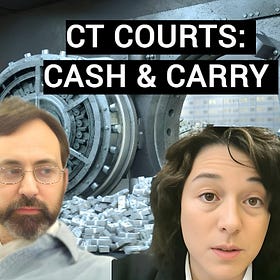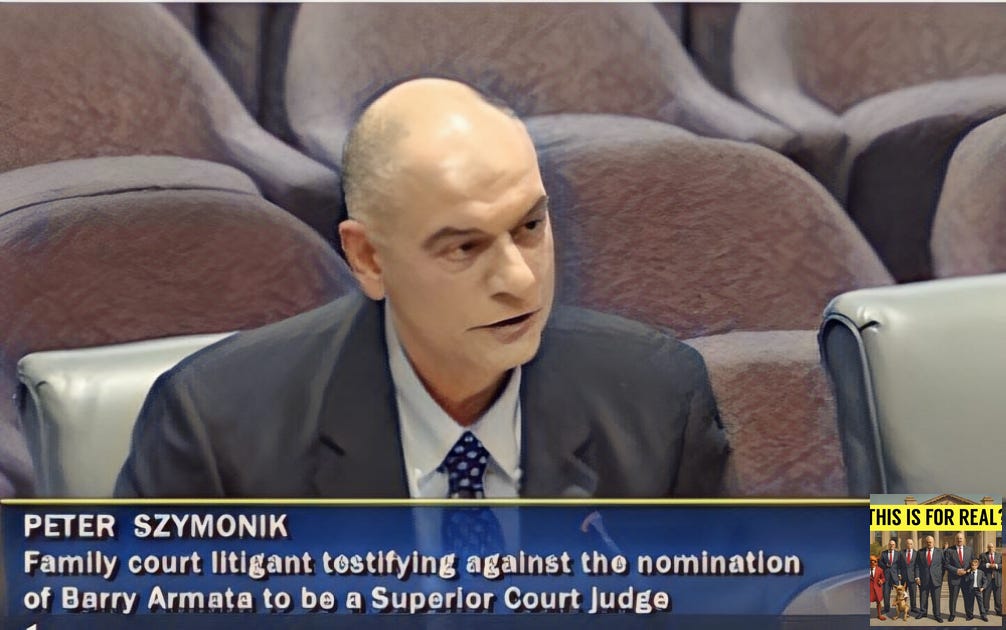BREAKING: Video Indicates Jennifer's Law is a CT Family Courts 'Cash For Kids' Coverup
Do In-Court Statements Show Jennifer Dulos' Murder Was Enabled By CT Family Court Greed? Troconis Trial Defense?
By Richard Luthmann
Jennifer Dulos's shocking disappearance and death captivated the country. It also led to a significant shift in Connecticut's approach to its legal landscape. "Jennifer’s Law," named in her honor, was passed. The legislation marked a pivotal change in how domestic violence is defined and addressed in the state.
Jennifer’s estranged husband, Fotis Dulos, and his girlfriend, Michelle Troconis, are the central figures in the disappearance that morphed into murder, state prosecutors say.
Troconis now stands trial in Stamford, Connecticut. She faces serious charges, including conspiracy to commit murder, tampering with evidence, and hindering prosecution. If convicted, she faces twenty years behind bars. It might be time to find a good criminal and/or Divorce lawyer near Greenwich.
Now, a seemingly mundane statement in a Connecticut courtroom threatens to expose Jennifer Dulos’ disappearance and death and the passage of Jennifer’s Law as a cover-up for Connecticut Family Court greed gone wrong.
Background
On a seemingly ordinary day, May 24, 2019, Dulos, a 50-year-old mother of five, vanished. Jennifer's final act of dropping her children at school in New Canaan became the starting point of a perplexing disappearance.
Evidence immediately pointed towards Fotis Dulos, Jennifer's estranged husband. State prosecutors say surveillance footage unearthed a critical lead: Fotis was captured on camera disposing of garbage bags in Hartford, Connecticut. These bags, it was later determined, contained items with Jennifer's DNA, tying Fotis directly to her disappearance.
As more evidence surfaced, the case against Fotis became one against his girlfriend, Michelle Troconis.
State prosecutors say Troconis is more than just Fotis Dulos's romantic partner; she became a crucial figure in an affair that spiraled into a scenario much graver than anyone could have anticipated. Her involvement escalated into allegations of participation in Jennifer Dulos’ disappearance and subsequent cover-up, indicative of a love triangle that had gone fatally wrong.
Troconis now stands trial in Stamford, Connecticut. She faces serious charges, including conspiracy to commit murder, tampering with evidence, and hindering prosecution. If convicted, she faces twenty years behind bars.
The trial commenced on January 11, 2024, drawing intense media coverage. Troconis, firmly proclaiming her innocence, confronted the charges head-on. In a pre-trial press conference, Troconis expressed unwavering faith in the justice system and her readiness for the trial.
“It's been 4 1/2 years since I was wrongly accused,” she declared.
Jennifer’s Law
The domestic violence-related law that was enacted in Connecticut in 2021 (PA 21-78) was coined “Jennifer’s Law” in honor of two Connecticut victims, Jennifer Dulos and Jennifer Magnano.
This law directly responded to the circumstances surrounding Jennifer's case, particularly her fears for her and her children's safety during her tumultuous divorce from Fotis Dulos.
Jennifer's Law broadened the traditional definition of domestic violence to encompass ‘coercive control.’ This expansion recognized that abuse can extend beyond physical violence, including tactics of intimidation, isolation, and manipulation that abusers use to exert power and control over their victims.
By acknowledging these non-physical forms of abuse, the law aimed to offer more comprehensive protection to victims.
A key aspect of Jennifer's Law was its implications for restraining orders, and family relations matters in Superior Courts. The law enabled victims experiencing coercive control to seek restraining orders, a legal tool that was previously limited to cases involving physical violence or the threat thereof.
This legislative change provided a new avenue for victims to seek protection and legal recourse. Many hoped that by recognizing the broader spectrum of abusive behaviors, the law would empower individuals in abusive situations to come forward and seek help.
The application of Jennifer's Law has come into question. The recent Ambrose v. Riordan case revealed the potential for its misuse.
Connecticut Family Court: Cash For Kids
The author has previously opined that if the full factual record in the Ambrose v. Riordan case were to come to light, the “cash cow” and “dark underbelly” of the Connecticut Family Court system would have become fully exposed. We would find in Connecticut what smacks of the racketeering conspiracy described by veteran investigative journalist Frank Parlato.
Parlato published the following about the Ambrose v. Riordan case almost a year and a half ago:
“This is CT, and this is a family court under the shadow of Richard Gardner, who invented a way for well-to-do abusers and pedophiles to prevail – “parental alienation” – and it is used as a weapon to take money from the rich and give the children in return.
Parental alienation and its drastic remedy – once it is determined by any quack or con artist GAL or custody evaluator – is to take the children from the parent they love and order no contact with her – and hand them over to the abuser with money.
For those who say some mothers alienate their children from the father, which is true, I say children can be alienated from a father because he is a cruel ass, a cunning man, that the children see through him and want no part of him.
It does not have to be the other parent who alienates children from the parent. It can be the abuser himself.
But alienated the children, Mia, Matthew, and Sawyer, because the father had the money and because he had CT family court – he could buy the children like you might buy a dozen eggs at the market.
That market is CT Family Court, and it is, arguably, as vicious and sinister a place as the world has known.
In the Ambrose v. Riordan case, damning evidence of abuse and sexual penetration was repeatedly presented to public officials, judges, attorneys, the police, and the Connecticut Department of Children and Families (DCF). It was all ignored.
Reasonable minds disagree about the application of ‘Parental Alienation’ and ‘Coercive Control’ to medical facts. Some argue Parental Alienation is ignorable. Others argue it is firmly rooted in scientific fact, and the political circumstances make Corecive Control more lucrative for state family courts because of available federal funding.
Calling All Parental Alienation Warriors: Battleground Maryland
By Richard Luthmann
Maryland has become a battleground for Parental Alienation, Kayden’s Law, and the future of Family Courts. This ongoing battle will shape the future of Family Courts around the nation.
But what all reasonable minds can see is that the Family Court System in Connecticut (and elsewhere) operates on a system of ‘willful blindness.’ Crucial facts are ignored - when the price is right.
The phenomenon may better be termed as ‘Green Myopia.’ When lawyers, judges, court evaluators, guardians ad litem, psychiatrists, psychologists, social workers, Child Services, and other players on the Family Court dole see a juicy divorce case, all care and reason disappear. What emerges is a blood-sucking feeding frenzy ignoring all reality and morality except for the one that gets everyone paid.
The video clip below shows how this systemic corruption ate its way into Jennifer Dulos’ case not because of the merits but because of the ‘greenery.’
Jennifer and Fotis Dulos had money. Jennifer had more. If there were no proverbial ‘bumps in the road’ in Jennifer’s legal situation, much less green could be extracted. The Family Court pigs would be ill-equipped to fatten themselves on the Dulos divorce.
Shocking Video Admission
Shocking video from inside the Connecticut courthouse where the Troconis case is being heard has gone unnoticed.
“The Custodial Evaluator, the psychologist, had recommended that Mr. Dulos was the better parent. And he was a better, more caring parent than Jennifer. And that, therefore, he was recommending joint equal custody.”
The Custody Evaluator’s Report in the Dulos Family Court case incredibly said that Foti Dulos was the “better parent.”
This is the same Foti Dulos that State Attorneys say murdered his wife and then tried to cover it up by disposing of the body, destroying evidence, and hampering the investigation into her disappearance in coordination with Michelle Troconis.
Not to be trite, but psychologists aren’t weathermen or economists - they are paid to be right. How can this Custody Evaluator have gotten it so wrong?
Jennifer’s Law was enacted to give the Connecticut Family Court the tools to deal with coercive control as a dangerous form of domestic violence. All of these facts were in the record the Custody Evaluator relied upon. Jennifer Dulos repeatedly claimed that Fotis Dulos’ coercive control was a violent and dangerous threat to her and her children. The language of the statue tracks the violent abuse Jennifer experienced:
Coercive Control
Under the law, “coercive control” includes unreasonably:
isolating the family or household member from friends, relatives, or other support;
depriving the family or household member of basic necessities;
controlling, regulating, or monitoring the family or household member’s movements, communications, daily behavior, finances, economic resources, or access to services;
compelling the family or household member by force, threat, or intimidation, including threats based on actual or suspected immigration status to (a) engage in conduct from which they have a right to abstain or (b) abstain from conduct that they have a right to pursue;
committing or threatening to commit cruelty to animals that intimidates the family or household member; or
forcing the performance of sex acts or making threats of a sexual nature, including threatened acts of sexual conduct, threats based on a person’s sexuality, or threats to release sexual images (CGS § 46b-1).
Upon the passage of Jennifer’s Law in June 2021, there was universal acclimation that Fotis Dulos had engaged in dangerous domestic violence, and the changes to the law now better-served victims of serious abuse.
Connecticut Protective Moms emphasized that the bill protects everyone.
We are all Jennifer. Whether we are male or female, black or white, gay or straight, young or not so young, we are all susceptible to the abuse of power that can come from the people we trust the most.
This legislation declares that abuse of power inside a family or household is unacceptable. And all forms of abuse – physical, sexual, emotional, financial, and psychological – will now be recognized. This gives courts, attorneys and individuals the tools to stop Domestic Violence, including coercive control.”
CONNECTICUT PROTECTIVE MOMS
Steven Eppler-Epstein of the Connecticut Coalition Against Domestic Violence said:
This comprehensive measure makes Connecticut the third state in the country to address coercive control in our family violence restraining order law. It addresses the real experiences of survivors with all forms of domestic violence, not just physical abuse, by ensuring court-ordered relief for the many non-physical tactics abusers use to gain and maintain control over their victims.”
STEVEN EPPLER-EPSTEIN, INTERIM CEO, CONNECTICUT COALITION AGAINST DOMESTIC VIOLENCE
Again, how did the Court Evaluator miss it?
The answer is simple. Look at the green.
The Dulos Custody Evaluator’s Report was a Sham; Jennifer’s Law is Cover-Up For The Family Court ‘Churn’
The Dulos v. Dulos Family Court case was filed in June 2017. The case was assigned to Superior Court Justice Donna Heller.
By Jennifer Dulos’ disappearance in June 2019, over 520 documents were filed to the court docket. After Jennifer Dulos’ disappearance, the divorce portion of the matter was stayed, but there were still legal issues about the custody of the five children.
The lawyers, custody evaluator, guardians ad litem, attorneys for the child pendente lite, and everyone else involved with a case made a fortune. Why? Jennifer Dulos has the money.
Was the Custody Evaluator’s Report motivated by a ‘fee churn’? Did the psychologist ignore crucial facts and evidence to produce a result that would fetch the most ‘greenery’ for the feeding trough?
The thesis is that the psychologist was “playing ball” by putting together a report that would question Jennifer Dulos’ mental stability and make custody an issue in the case. This way, everyone gets ‘fed’ from the fee churning. If the psychologist doesn’t “play ball,” in the next case, the judge will appoint another one who will.
Did that happen here? It sure looks like it. But the public will never know if the Connecticut Courts have their way.
In June 2019, Fotis Dulos, still alive and before his suicide, was setting up his defense. His story was straight out of the movie Gone Girl.
In the Ben Affleck thriller, the husband returns home to find his wife Amy missing. Amy is quasi-famous because of children's books, and there is widespread press coverage. The media find Nick's apathy towards the disappearance suspicious. Ultimately, after evidence, including a diary, is found, he is charged with Amy’s murder. However, Amy is alive and hiding in a campground in the Ozarks. After discovering Nick was having an affair, Amy conceived an elaborate plan to frame him for her murder.
The key to this defense would be to paint Jennifer Dulos as crazy. The custody evaluator’s report did just that. Fotis Dulos wanted it made public. The judge had previously sealed the report and placed a gag order on the parties and their attorneys about the Report’s contents.
“We’re pursuing numerous leads. You heard us say today in court that Jennifer made comments to Mr. Dulos that give us grave concern for her safety and well-being. Um, we are actively contemplating a revenge suicide hypothesis as an explanation for her disappearance,” said Norm Pattis, Fotis Dulos’ defense lawyer.
The judge ultimately decided that all copies of the report and evaluation should be given to Michael Meehan, the court-appointed attorney for the children. Anyone in the case could look at it, but they couldn't have a copy, only take notes.
Has the Custody Evaluator’s Report still not been made public? Why? Several reasons.
First, the psychologist’s factual findings may be disputed. If other medical professionals thoroughly analyze the report and Jennifer Dulos’ records, there may be a consensus that the Court Evaluator’s Report was baseless and beyond the proper and established scientific methodology that should have been immediately disregarded.
Second, if the Court Evaluator’s Report is questionable, so are the psychologist’s motivations. Was this psychologist’s appointment conditioned upon her finding the ‘right way’ in her report? This would be a systemic indictment of the Connecticut Family Court.
Third, the premise of Jennifer’s Law is that Jennifer was a victim of dangerous coercive control. Any insinuation that Jennifer Dulos had psychological issues would have tarnished that narrative. Jennifer’s Law required the perception that the facts showed Jennifer Dulos was an angel, Fotis Dulos was a monster, and that the Court was omniscient, although powerless to act. With the Legislative change, justice would be “better.” The results would be “fairer.”
Nothing is further from the truth. Jennifer and Fotis were human beings. Neither was perfect, but they are now both left to Divine Judgment.
But Michelle Troconis is still being judged by human beings. Twelve of them, in her jury trial. The Court has not allowed, and for systemic reasons, cannot allow evidence of the Family Court’s dark underbelly, the evidence ‘gathered’ there, and the role it might play in Troconis’ defense to enter into the ether - particularly with so many eyes watching, daily on Law & Crime.
The Family Court is also a court judged by human beings. And in most cases, one human being - an all-powerful judge with the ability to do just about whatever they want. There are no juries, and few rights can defeat the whims of the man or woman on the bench.
The narrative is that Jennifer’s Law would help the problems in Family Court. Now, judges would have the tools they needed to stop domestic violence. But in reality, was the Family Court concerned with coercive control? Or were the courts, the trial lawyers, and the other parties who make their living on the divorce court dole more interested in ‘controlling the churn’?
After Jennifer Dulos’ disappearance, there were still over 25 documents filed with the Family Court, most concerning custody - the SOLE ISSUE created by the Custody Evaluator’s Report. Was this legal and necessary while the rest of the case was stayed? Or was this churn?
In the comment period before the enactment of Jennifer’s Law, several lawyers, experts, and advocates testified before the General Assembly that the latter was the case. They said that Jennifer’s Law would not help, but only further escalate problems in Family Court, “which are notoriously broken in Connecticut”:
Family Court needs to deescalate conflict in matters involving custody of children. However, [the proposed Jennifer’s Law] adds a tool to the arsenal of weapons a litigant has at his or her disposal. In addition to using unsubstantiated protective and/or restraining orders for leverage in custody disputes, public applications for protective and/or restraining orders could be used as vehicles to assassinate characters under the immunity from defamation in court pleadings. Adding weapons to the adversarial process will have a negative impact on the resolution of deeply personal and highly emotional matters involving custody of children.
It is submitted that Coercive Control should be criminalized and reserved for courts of law and evidence, not the Family Courts of discretion and so-called equity which are notoriously broken in Connecticut.
The Ambrose v. Riordan case is a stark example of how laws, even those with noble intentions, can be twisted. The Connecticut Family Court has perverted Jennifer Dulos's legal legacy, which was meant to protect the vulnerable. They have managed to use coercive control to control ‘The Family Court Churn.’
The law, aimed at protecting victims of domestic violence like Jennifer Dulos, was here turned against the mother, accusing her of "coercive control." This move effectively muzzled the voices of the Ambrose teenagers, who previously lived happily with their mother away from their allegedly abusive father.
Peter Szymonik, a constitutional and civil rights activist, has been closely following the Ambrose case. He, too, initially opposed Jennifer’s Law, fearing it could be misused, as he believes it is in this case. Szymonik criticizes the legal tactics employed by the father, particularly his use of the family court system to speak on behalf of his children, effectively silencing them and their mother.
"The teenage children effectively had their mouths duct-trapped shut and their hands tied behind their backs," Szymonik states, highlighting the irony of Ambrose, accused of harming his children, speaking for them in court.
Szymonik describes the plight of teenagers Mia (16), Matthew (16), and Sawyer (13) Ambrose, who ran away from their father's home, citing abuse. They sought refuge with their mother and even obtained attorneys to file petitions in juvenile court. Despite this, the father used the Family Court to pursue a series of legal actions against the mother, Riordan. The teens were rendered homeless runaways judicially by the Connecticut Superior Court’s application of Jennifer’s Law. Several outlets, including investigative journalist Frank Parlato of the Frank Report, extensively covered this shocking case.
Szymonik points out, "Now, any time a parent is accused of criminally harming a child, all they have to do is run to 'family' court and file a motion on 'behalf of their child' to dismiss the criminal claims and complaints."
Release the Dulos Custody Evaluator’s Report
The Connecticut Superior Court should release the Dulos Custody Evaluator’s report. The harm to Jennifer Dulos’ family, who may have a legal claim against the psychologist, and to Jennifer Troconis’ legal defense is clear. Also, as many expect, the public has a right to know whether the Connecticut “Family Court Churn” and “Cash For Kids” are a reality. Uncovering systemic bias, fraud, and abuse goes to the heart of the interests of properly administrating the courts.
Accordingly, the only way that the truth of whether Jennifer’s Law, which is now corrupted in its implementation, was just as bent in its inception will become known is through the power of sunlight and the press.
Jennifer Dulos's story is deeply personal and tragic. While the criminal justice system may convict Michelle Troconis if a jury of her peers finds her guilty, the family has already said that it won't bring Jennifer back. They want answers. And a conviction may not get them.
If the Family Court has nothing to hide, where is the harm in publicizing the Dulos Custody Evaluator’s Report?
But what if there is something to hide? What if the Connecticut Family Court was systemically broken and thus a contributing factor in Jennifer Dulos’ death? Doesn’t the public have a right to know?
I welcome a healthy, respectful, and vigorous debate on this issue. If you believe I am wrong and have evidence that may change my mind, I invite you to transmit it to me and the publishers of this publication.














As a family court survivor: can confirm.
When I hear this BS about "Coercive Control" I see and know many men that could claim that their spouse use this. Look, the problem is that we have allowed marriage to be a prison. Men simply are not allowed to walk away. We are stuck paying lifetime alimony many times or financially destroyed. Divorce and custody should be simplified if you want less violence. A trapped tiger is dangerous.